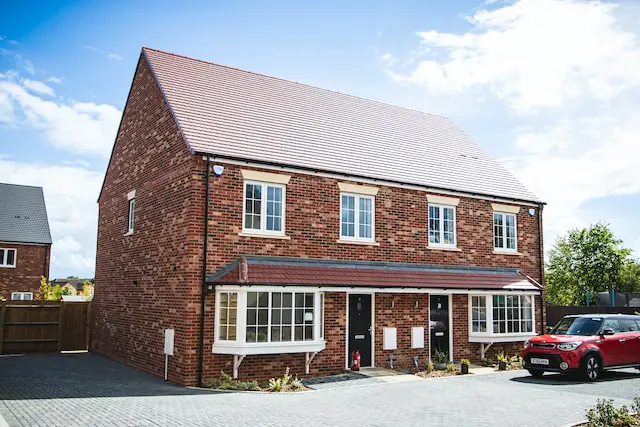What Is a Chain-Free Property? Pros and Cons for Buyers (UK 2025 Guide)
Thinking of buying a chain-free property in the UK? Learn what “chain-free” really means, its benefits and drawbacks, and how it compares to chain property purchases. A must-read for first-time buyers and savvy movers.


 What Does Chain-Free Mean When Buying a House in the UK?
What Does Chain-Free Mean When Buying a House in the UK?
In the UK property market a chain-free property is one where there is no onward chain —in other words the seller is not dependent on buying another property to complete their sale.
Common examples of chain-free homes:
A vacant property (e.g. new build or inherited house)
A rental property where the landlord is selling up
A repossessed property owned by a bank or mortgage lender
A property being sold by a developer or housing association
 Keyword focus: chain-free meaning UK
Keyword focus: chain-free meaning UK
This can offer a much faster simpler purchase—especially valuable in a market where chains can easily fall apart.
 What Is a Property Chain?
What Is a Property Chain?
A property chain happens when multiple home sales and purchases are interdependent.
Example of a property chain:
Buyer A wants to buy from Seller B
Seller B wants to buy from Seller C
Seller C needs to buy from Seller D…
If any link in the chain breaks—due to financing issues survey problems or a change of heart—the entire chain collapses delaying or derailing everyone’s move.
 That’s why chain-free properties are highly attractive to buyers who want more certainty and speed.
That’s why chain-free properties are highly attractive to buyers who want more certainty and speed.
 The Advantages of Buying a Chain-Free Property
The Advantages of Buying a Chain-Free Property
Benefit | Description |
|---|---|
| No onward purchase = fewer delays and paperwork |
| No chain = fewer parties involved so lower fall-through rate |
| Sellers often prefer chain-free buyers due to speed |
| No juggling between multiple solicitors and moving dates |
| No sale of your own = perfect match with a chain-free home |
A chain-free property can significantly increase your chances of a smooth successful purchase —especially in competitive markets.
 Are There Any Downsides to Chain-Free Properties?
Are There Any Downsides to Chain-Free Properties?
Yes—although the benefits often outweigh the risks here are a few potential cons:
1.  Higher Competition
Higher Competition
Chain-free homes attract lots of interest particularly from first-time buyers and cash buyers so competition (and price) can be higher.
2.  Could Be Empty for a While
Could Be Empty for a While
If it’s been vacant check for:
Damp or unheated damage
Outdated electrical systems
Vandalism or neglect (for repossessions)
3.  Limited Negotiation Time
Limited Negotiation Time
Because sellers often expect a quick sale there may be less flexibility around move-in dates or negotiations.
4.  Potential Legal Complexity (e.g. probate)
Potential Legal Complexity (e.g. probate)
In inherited or repossessed properties title transfer or probate issues can delay progress if not properly handled.
 Chain-Free vs Chain Property: What’s the Difference?
Chain-Free vs Chain Property: What’s the Difference?
Feature | Chain-Free Property | Chain Property |
|---|---|---|
Speed of Sale | Faster (4–8 weeks) | Slower (8–16+ weeks) |
Risk of Collapse | Lower | Higher |
Buyer Appeal | More desirable | Less desirable |
Price Negotiation Power | Stronger | May have to match other offers |
Complexity | Lower | Higher (more parties involved) |
 If you're in a position to move quickly choosing a chain-free property may save you time money and headaches.
If you're in a position to move quickly choosing a chain-free property may save you time money and headaches.
 Tips for Buying a Chain-Free Property in the UK
Tips for Buying a Chain-Free Property in the UK
1.  Check the Seller’s Situation
Check the Seller’s Situation
Ask:
Is the property vacant?
Is it probate part-exchange or a landlord sale?
Knowing the reason behind the sale helps you plan timelines and expectations.
2.  Get a Mortgage in Principle First
Get a Mortgage in Principle First
Chain-free sales move quickly. Get your Mortgage in Principle (MIP) ready to prove you're serious and avoid delays.
3.  Arrange a Full Survey
Arrange a Full Survey
Just because it’s chain-free doesn’t mean it’s perfect.
If the property has been empty commission a homebuyer’s report or building survey to check for:
Structural issues
Damp or mould
Electrical and boiler age
4.  Move Quickly with Legal Checks
Move Quickly with Legal Checks
Choose a solicitor experienced with fast completions.
Make sure they:
Begin searches immediately
Prioritise communication
Have experience with probate or repossession cases (if relevant)
 Who Benefits Most from Chain-Free Properties?
Who Benefits Most from Chain-Free Properties?
 First-time buyers
First-time buyers Buy-to-let investors
Buy-to-let investors Downsizers with no onward purchase
Downsizers with no onward purchase Cash buyers
Cash buyers Anyone wanting to avoid delays
Anyone wanting to avoid delays
 Final Thoughts: Is Going Chain-Free Worth It?
Final Thoughts: Is Going Chain-Free Worth It?
In a word: yes —especially for first-time buyers downsizers and anyone looking to move quickly with minimal hassle.
A chain-free property offers:
Certainty
Speed
Less stress
Stronger bargaining power
That said always do your due diligence and be prepared to act fast.
 Looking for chain-free homes in your area? Combine your search with tools like:
Looking for chain-free homes in your area? Combine your search with tools like:
Area crime and amenity comparisons
Mortgage affordability checks
Solicitor document review summaries
 Start your home-buying journey smarter with WiseNest — your AI-powered assistant for buying your first home in the UK.
Start your home-buying journey smarter with WiseNest — your AI-powered assistant for buying your first home in the UK.
Editorial Standards & Expertise

WiseNest Editorial Team
Our expert editorial team consists of seasoned technology professionals, business strategists, and digital transformation specialists with over 15 years of combined experience in helping businesses navigate the digital landscape.
This content is optimized to answer these questions comprehensively.
What does chain-free mean when buying a house in the UK?
Chain-free means the seller doesn’t need to buy another property to complete the sale. There’s no onward chain, which makes the transaction simpler and faster.
Are chain-free properties better?
Often, yes. They reduce risk, speed up completion, and offer buyers more certainty—especially helpful in competitive housing markets.
Why are chain-free properties more expensive?
Because they’re in high demand. Many buyers are willing to pay a premium for a smoother, quicker purchase with fewer risks.
Is a first-time buyer chain-free?
Yes. First-time buyers don’t have a property to sell, so they’re considered chain-free. This often makes them attractive to sellers.
Can a chain-free property still fall through?
Yes, but it’s less likely. Issues like mortgage rejections, survey problems, or legal delays can still cause problems—but with fewer parties involved, the risk is much lower.
How fast can you complete on a chain-free house?
If everything is in order, you could complete in as little as 4–6 weeks—especially if you're a cash buyer or have your mortgage in principle ready.
Join 10,000+ Smart
First-Time Buyers
Get expert homebuying guidance, AI-powered document analysis, and step-by-step support for your first property purchase.



Growing community
Already have an account? Sign in here
Related Articles
Continue exploring our insights and tips
![Flood Zones, Noise, and Crime: What Area Reports Can Reveal to UK Homebuyers [2025 Guide]](https://a.storyblok.com/f/335762/1666x850/c67f7cec43/map-from-check-flooding.png)
Flood Zones, Noise, and Crime: What Area Reports Can Reveal to UK Homebuyers [2025 Guide]
Buying a home? Learn how area reports reveal risks like flood zones, noise pollution, and crime rates. This 2025 UK guide explains why they matter and how to use them before making an offer.
![What Is Indemnity Insurance and When Might You Need It? [2025 UK Buyer’s Guide]](https://a.storyblok.com/f/335762/2560x1707/d026575128/what-is-indemnity-insurance-scaled.jpg)
What Is Indemnity Insurance and When Might You Need It? [2025 UK Buyer’s Guide]
Buying a home in the UK? Discover what indemnity insurance is, when it’s needed, typical costs, and how it protects buyers and lenders from legal risks in property transactions.
![What Surveyors Don’t Check: Common Misunderstandings Every UK Homebuyer Should Know [2025 Guide]](https://a.storyblok.com/f/335762/352x240/c7bfdabdfb/survey-female-352x240-jpg.webp)
What Surveyors Don’t Check: Common Misunderstandings Every UK Homebuyer Should Know [2025 Guide]
Thinking of getting a house survey? Learn what surveyors don’t check, the most common misunderstandings, and what extra inspections UK homebuyers may need in 2025.




